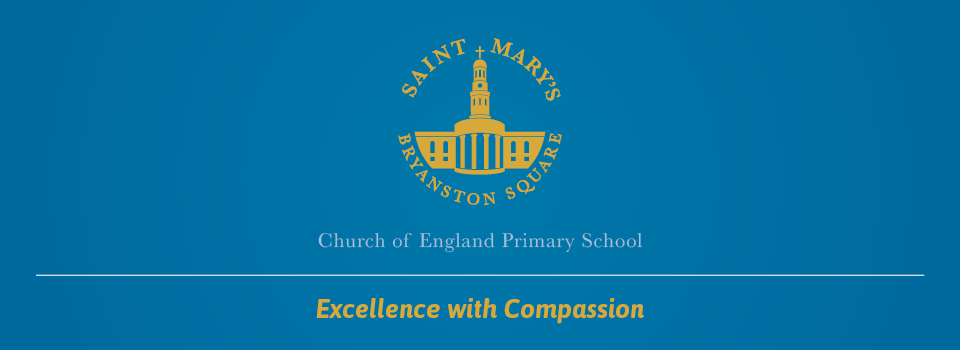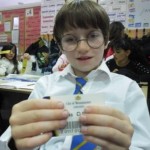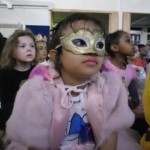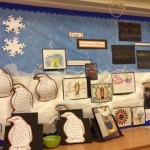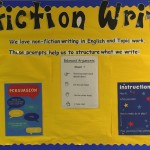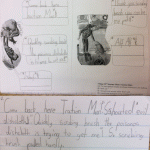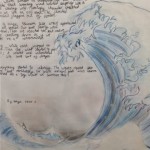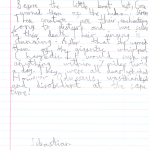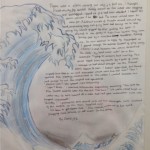English, often termed ‘Literacy’, is a core subject which spans the whole of the curriculum.
Reading
At St Mary’s we recognise that a love of reading impacts positively on pupils’ learning in all areas of the curriculum, and fosters a lifelong love of learning.
We use high quality, whole texts (‘core’ texts) that take into account the interests and particular needs of our children. We read aloud daily to children to give them access to language of greater richness and complexity than they would otherwise encounter. We give opportunities for children to read texts from a variety of genres, languages and contexts and recognise that these experiences are found in all areas of learning across the curriculum.
Although reading is used throughout the curriculum, it is directly taught in weekly or bi-weekly discrete sessions that last 15 – 30 minutes. Children are grouped according to individual need and this is assessed by their progression through benchmarked books are taught the full range of skills that they require to decode a range of texts as well as respond to the texts with insight.
How can parents help?
Parents have the ability to influence their child’s attitude to reading and ensuring they have a positive attitude to reading. Talking about books and sharing them together is an enjoyable and effective activity. Reading with your child can take many forms and doesn’t necessarily have to be limited to a particular genre, or even language. At KS1 we ask for your support in filling out a home/reading record that indicates you have heard your child read. In KS2, the children complete reading diaries which give them a chance to reflect on their understanding of what they have read.
Useful links:
https://www.literacytrust.org.uk/
https://www.nelson.com/pmfamily/documents/PMFamilyOverviewBrochure.pdf
Celebrating World Book Day:
Writing
We believe that language is a powerful tool for learning and social development. We are committed to developing pupils’ competence in their understanding and expression of spoken and written language through careful planning, teaching and assessment.
We understand that writing is a complicated process involving the skilful orchestration of transcriptional skills (handwriting, spelling) and compositional ones (structure, grammar, vocabulary, understanding of audience). We teach the compositional aspects of writing within the context each particular genre and the transcriptional aspects in discrete, 15 – 30 minutes sessions. As far as possible, we separate out the skills involved in each genre of writing so that they are practiced individually before being co-ordinated in a final, extended piece of work.
All year groups have the opportunity write in an extended way once a week. In addition to this, they have a cross-curricular ‘Topic Writing’ session on a weekly basis too. The writing produced is marked with next steps to help each child improve their work. Although we have specific sessions devoted to writing at length, we recognise that writing occurs every day in almost all areas of the curriculum and as such, is the key to children’s ongoing practice, understanding and application of all skills, and not just those involved specifically in English.
Our planning provides a range of scaffolds to support success. These scaffolds include; talk for writing, drama and role play, writing for a range of purposes and audiences, explicit grammar teaching, exposure to high quality texts, visual and language scaffolds alongside the systematic teaching of spelling and handwriting.
How can parents help?
Parents can support children’s writing by encouraging them to write for a range of purposes and audiences at home. For example;
- Shopping lists/ to do lists
- Diaries
- Letters
- Story writing
- Captions and labels
This can be in English or in their home language. Furthermore, parents can encourage their children’s writing achievements through supporting the homework, handwriting and spelling that have been set for them.
Links:
https://www.st-marys.calderdale.sch.uk/our-curriculum/literacy/sue-palmer-models-for-writing - skeleton books online
Spelling & Phonics
We recognise that spelling is an important skill and, for children to become confident, fluent writers, they must have a secure grasp of the building blocks of spelling: phonology (the sounds in words), morphology (how words are built) and etymology (where words come from).
In F2 and KS1, children learn to spell through the discrete teaching of daily phonics in 15 – 30 minute sessions. We use ‘Letters and Sounds’ – a progressive synthetic phonics programme. We also use Jolly phonics actions to help the children remember each of the 44 phonemes/sounds. What is learnt during these discrete sessions is applied through the day in speaking, reading and writing, in a language rich curriculum.
As children become more proficient writers, they move from differentiated daily phonics to weekly whole class spelling lessons. This whole class teaching focuses on the spellings and related rules listed in Appendix 1 of the New National Curriculum for English. Teaching is focused on identifying root words, prefixes and suffixes, the rules associated with these, why some words are spelt unusually and the identification of exception words.
How can parents help?
Talking about the words, letters and sounds that you see and hear around house and when you are out and about will support your child’s learning in phonics. Singing nursery rhymes and reading poems will improve their ability to distinguish between sounds. When children are learning about word roots, prefixes and suffixes, collecting words from the environment (in their own reading or when they are out and about) and identifying patterns in them will support your child’s understanding of how words are built. It is always interesting to work out which language words originate from and if you speak more than one language, you will find that it is a rich resource to draw from.
Links:
https://www.gov.uk/government/publications/letters-and-sounds
https://jollylearning.co.uk/2010/11/03/jolly-phonics-actions/
St Mary’s Phonics Curriculum:
